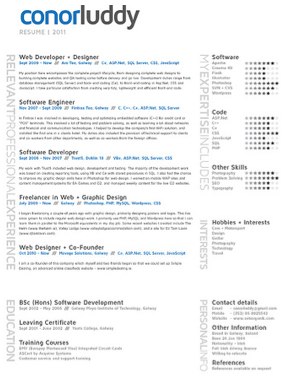 There’s no need to panic if you have never written a resume, or you haven’t edited yours in a long time. This happens to most of us from time to time, and thankfully resumes are always easy to fix. Here are a few ways you can avoid an unprofessional looking resume.
There’s no need to panic if you have never written a resume, or you haven’t edited yours in a long time. This happens to most of us from time to time, and thankfully resumes are always easy to fix. Here are a few ways you can avoid an unprofessional looking resume.
Create/Edit the Format
It’s not hard to find templates dedicated to the standard resume format (see the “Circles Template). You should follow this template fairly strictly (at least in the beginning) as far as the following points are concerned:
- Indentation
- Spacing
- Grammar
- Bullet point construction
- and parallel construction (similar structure of words and phrases)
You do not have to follow it word for word in your phrasing though. If you want to turn the Achievements/Involvements section (see below) into a section, say, to a list of all the short stories you have published that is your prerogative.
Don’t stick to one format for every employer. Change the information so only the most salient experience is on it. Experiment with it. Make it the best it can be. Just be sure to put all the salient information into the resume that is required for a particular job description.
Write/Edit the Text
Forget all the fancy stuff for a while. The first thing you should do is either write or edit the text. A standard resume should not exceed two pages (although most often every resume can be done on one page). It should have five to seven relevant sections that list all, or most, of your work experience:
- Heading- gives your name and contact information.
- Education- tells the employer what grade level you have achieved, where you went to school, and relevant class work you completed if it directly applies to the job.
- Technical Information- tells the employer what computer programs you are capable of using.
- Related experience- experience directly related to the job you are applying for
- Other work experience- only relevant if you have jobs that aren’t directly related to the job you are applying for.
- Achievements/Involvements- this is where you list other certifications and activities that aren’t directly related but that you still consider important to who you are as an employee. i.e. Licenses, Certificates, Clubs, Teams, etc.
Remember to write everything in lists. Stay to the point. If you find yourself writing sentences about the tasks you were assigned at a given job, then you have written too much. An easy way to keep from doing this is by focusing on action verbs and using very few adjectives and adverbs afterward. The following is an example:
Blog Editor and Writer: example.com
Nowhere, TX
- Researched copy for blog posts
- Drafted and edited copy for online blog
- Optimized blog posts for search engines
- Brainstormed, shot, and edited videos for the blog
And don’t forget to edit: for content, grammar, and typographical mistakes.
Play with Color
The resumes that standout most these days are the ones that use color or graphic design in a pleasing way. Don’t be afraid to experiment with a bit of color.
There are a lot of good blogs and resources full of resume tips out there if you still need help. There’s also no shame in hiring someone to help you craft an industry specific template for you to work with when you are trying to start your sales career.


No Comments » Subscribe to RSS